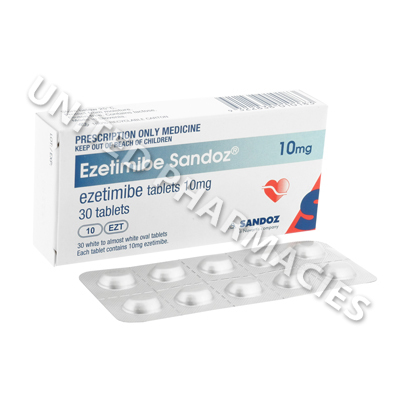Customers also like
Ezemibe (Ezetimibe) - 10mg (30 Tablets)
our best price : $6.83
Description
Ezemibe (Ezetimibe) is known as a cholesterol absorption inhibitor, and it is indicated for the lowering of cholesterol levels in patients affected by conditions such as hypercholesterolaemia. It has also been prescribed to patients affected by rare inherited conditions such as phytosterolaemia and homozygous sistosterolaemia. In patients with high cholesterol, it is frequently used alongside exercise and special dietary plans, and in some cases, it may be used alongside statins.
Ezemibe (Ezetimibe) tablets contain 10mg of the active ingredient. Adults treating hyperlipidaemia or sisterolaemia are sometimes instructed by their doctor to take 10mg once per day. Generally, 2 weeks of treatment are needed for an improvement in cholesterol levels to occur. However, the correct dosage can vary depending on your health, medical history, and the severity of the condition being treated. Never self-medicate or change your dosage without first consulting your doctor.
Patients will also need regular blood tests so as to check the level of cholesterol in their blood. It is important to keep taking this medicine as directed, and not to stop treatment unless told to do so by a doctor.
Taking Ezemibe (Ezetimibe) to lower cholesterol levels may cause some side effects, such as:
- Coughing
- Flatulence
- Tiredness
- Nasal stuffiness
- Pain that occurs in the joints
Patients who experience side effects while being treated with this medicine must tell their doctor. You must go to visit your doctor straight away if you experience pancreatitis, muscular weakness, fever or any other symptoms which are severe.
Severe muscular problems have been associated with Ezemibe (Ezetimibe). If signs of this occur, you must immediately see your doctor.
Patients who take Ezemibe (Ezetimibe) may be requested by their physician to have blood tests conducted both before and after the commencement of treatment so that the liver function can be checked.
Consult your physician immediately if you notice muscle pain that occurs suddenly, as this could be a sign of severe muscle breakdown, which could lead to kidney damage if not properly treated.








